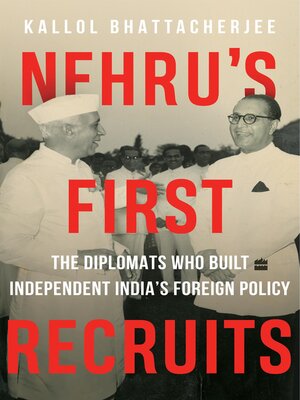Nehru's First Recruits
ebook ∣ The Diplomats Who Built Independent India's Foreign Policy
By Kallol Bhattacherjee

Sign up to save your library
With an OverDrive account, you can save your favorite libraries for at-a-glance information about availability. Find out more about OverDrive accounts.
Find this title in Libby, the library reading app by OverDrive.



Search for a digital library with this title
Title found at these libraries:
| Library Name | Distance |
|---|---|
| Loading... |
Independent India's first Prime Minister Jawaharlal Nehru and his team faced the colossal task of building the infrastructure for a new state that was rising from the ashes of war, famine and communal strife. One of the first administrative innovations was the formation of the Indian Foreign Service (IFS). In 1958, once its posts were finally filled, it was decided that the names of the extraordinary men and women who were the first to represent Indian on the world stage would be published as the History of Services of Officers of the Indian Foreign Service (Branches A and B). That slim, 'restricted - for official use only' volume is the inspiration for Nehru's First Recruits.
Among others, author Kallol Bhattacherjee writes about Brajesh Mishra, who initiated dialogue with Beijing to restart relations disrupted in 1962; Mira Ishardas Malik, the first Indian woman diplomat to serve in China; Eric Gonsalves, who handled the biggest ever evacuation of Indians from a foreign crisis; K. Natwar Singh and Romesh Bhandari, who served for many years even after retiring from the IFS; Cyril John Stracey, who served with Netaji Subhas Chandra Bose; Harivansh Rai Bachchan, who was responsible for the name 'Videsh Mantralaya'; and Mirza Rashid Ali Baig, M.A. Jinnah's former private secretary who became a towering chief of protocol whose legacy resonates in South Block even today.
Through the stories and experiences of India's earliest diplomats, this book, for the first time, presents the foundational history of the country's diplomatic corps and indeed the beginning of the country's engagement in global affairs.







